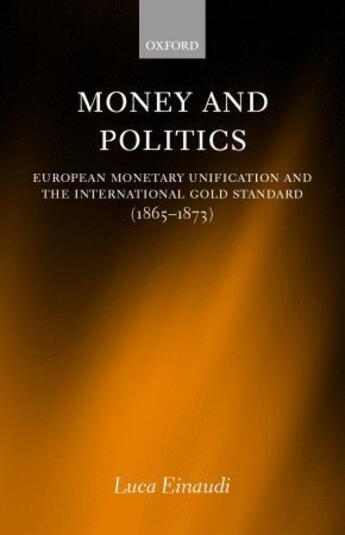-
Date de parution : 16/09/2010
-
Editeur :
Oxford Up Elt
-
EAN : 9780199243662
-
Série :
(-)
-
Support :
Papier
Résumé:
Detailed account of a little-known precedent of the Euro using hitherto unknown sources Comparative European approach Multidisciplinary and of interest to the non-specialist Money and Politics reconstructs for the first time the full history of the creation of the Latin Monetary Union (LMU), a... Voir plus
Detailed account of a little-known precedent of the Euro using hitherto unknown sources Comparative European approach Multidisciplinary and of interest to the non-specialist Money and Politics reconstructs for the first time the full history of the creation of the Latin Monetary Union (LMU), a long forgotten precedent of the Euro. It focuses in particular on the attempted transformation of the LMU into a European Monetary Union between 1865 and 1873. The use of extensive diplomatic and banking archives in France, Britain, Italy, and Germany has enabled the author to reconstruct in detail the intellectual debate concerning the gold standard and bimetallism, as well as the surrounding political and diplomatic manoeuvres, which in many ways anticipated the conflicts of today's monetary unification.
Einaudi's findings show that the project of a common currency was well received in central and southern Europe, but worked against the emergence of a united Germany, and was blocked by the Franco--Prussian war. In Britain, Disraeli declined to join the Latin Monetary Union, but in 1869, the new Liberal Chancellor of the Exchequer saw the advantages offered by a scheme which appeared to be enjoying success on the Continent, and attempted to join the monetary union, thereby alienating and securing the opposition of both the City and Gladstone.
This book is written in an accessible and multidisciplinary fashion, and will appeal to economists, historians, and political scientists with an interest in the formation and readjustment of government policies. It also paints a fascinating picture for policy makers and all those concerned with current debates surrounding EMU and the British position.
Readership: Academics and advanced students in European history, politics, economic history, and economics. Also policy makers and the general public interested in current debates about EMU.
Donner votre avis














